The Ministry of Industry, Commerce, Agriculture and Fisheries – Jamaica
Talking Commerce, Investments, Industry, and Jamaica with Minister Audley Shaw
Business View Caribbean interviews Minister Audley Shaw, with the Ministry of Industry, Commerce, Agriculture and Fisheries Jamaica. Discussing his new assignment, economic climate and more.
Audley Shaw is a Jamaican politician who has been a Member of Parliament since 1993, and currently serves as the Minister of Industry, Commerce, Agriculture and Fisheries. Business View Magazine first spoke with Minister Shaw about a year ago, just after his second tenure as Minister of Finance and The Public Service, a post in which he served from 2007 to 2012, and again, from 2016 to 2018.

Minister Audley Shaw
We spoke with Minister Shaw, recently, to find out about his new assignment, about his new Ministry’s mandate and mission, and about why he switched portfolios and responsibilities. We also wanted an informed update on the current economic climate in Jamaica, and about how some of his programs and initiatives, when he served as Minister of Finance, helped revive the country’s economy. The following is an edited transcript of that conversation.
BVM: Could you provide some perspective on the current status of Jamaica’s economy?
Shaw: “The conditions that exist now are much improved over a number of years ago. I think the main reason for that improvement is that the macroeconomic climate is improving; the cost of money for the private sector is going down. There is also less competition by government for credit, and because of that, the private banking system is obliged to find creative ways to get more financing into the hands of the private sector.
“What has happened for far too long is that the government has been crowding out the private sector from investment by the government, itself, borrowing too much money, which also led to driving up the cost of money. A banker told me, this morning, that because the government’s appetite for borrowing money has so drastically gone down, they are being forced to find new methods of attracting private sector loans. So, now, that’s part of the major turnaround that’s taking place in the economy.”
BVM: What did you do as Minister of Finance to help that turnaround occur?
Shaw: “When I became Minister of Finance in 2007, the government was borrowing money in the international capital markets at 12 percent. That’s ‘junk bond’ rates. And I changed that completely. I re-engaged aggressively with multi-lateral institutions like the IMF (International Monetary Fund), the World Bank, the Interamerican Development Bank (IDB), the European Union, so that by 2011, we borrowed US$600,000,000 from the IDB at interest rates between two and three percent. That was a radical shift in government policy.
“And the other thing that is driving the local financial sector to become more accommodating to the productive sector is that we created a junior stock exchange in 2009. The junior stock exchange has helped to make our stock exchange the most vibrant in the world over the past five years, in terms of growth; it has grown 240 percent.
BVM: With so much success at the Ministry of Finance & the Public Service, why did you move to Industry, Commerce, Agriculture and Fisheries?
Shaw: “I was, perhaps, destined for this job. I helped my father plant Irish potatoes and milk the cows and raise the pigs and chickens. In 1969, when I was 17 years old, I was elected national president of the Jamaica Four-H Clubs. But, in March of this year, I received the Caribbean Outstanding Finance Minister Award from the Global Monitoring Report, the official reporting people for the World Bank and the IMF, and subsequently got the Finance Minister of the Year Award from the Jamaica Observer newspaper. So, maybe the Prime Minister figured that I had reached a plateau there and needed to find another area of challenges. And what more could it be than this experiment combining industry, commerce, agriculture, fisheries, and investment.”
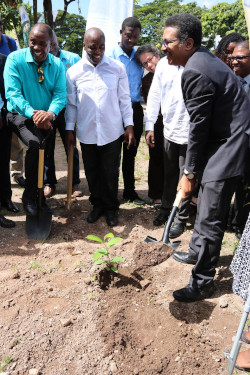 BVM: Investment? How did that become part of the ‘experiment,’ as you call it?
BVM: Investment? How did that become part of the ‘experiment,’ as you call it?
Shaw: “When the Prime Minister appointed me to the position, he took investment from his office and added it to my portfolio. There are about 40 agencies that report to the Prime Minister’s office in the areas of economic growth and job creation. And now, a similar number of agencies report to my office. So, the Prime Minister’s office and my office are the two ‘super’ ministries in the country.”
BVM: So then what is the actual mandate of your new ‘super’ Ministry?
Shaw: “The primary role of this Ministry is to ensure that we are aggressively promoting investment and that we create as much value-added as possible in the country. In other words, if you recognize where we’re coming from, we were, basically, a producer of commodities – like sugar. And what we have not had enough of in this country is what you call the ‘practical integration’ from what you grow in the ground to what you process via an agricultural processing industry; not only the satisfaction of local consumption but to export surpluses abroad. This is my mission now: in this for age of less consumption of sugar, we have to rationalize the sugar industry and rationalize the land usage. There is far too much land that has been appropriated for sugar and is now idle. So we have to get those lands into production in other areas.
“We also have to diversify our production base and make sure we are feeding ourselves with freshly grown produce and feeding the record number of tourists who are coming to our land. Far too many planes are carrying in the food to feed them, when we can feed them, here. And then, we need to target the export markets of the CARICOM region, for which we have duty-free entry. And then, of course, our fourth target would be the Jamaican Diaspora, in places like Canada, the United States, and England. These are all markets waiting for what we can produce fresh and what we can process into durable goods for sale. And then, one more critical market: the feeding of our school children; 80 percent of what we are using to feed them, we are importing from abroad – flour and rice.”
BVM: What products can replace sugar?
Shaw: “There’s a wide range of things that are credible alternatives to sugar cane and can grow on sugar cane land. We have thousands of acres of land to produce things like pumpkins and sweet potatoes – these are things, by the way, that are much more nutritious than the almost synthetic-like flour that we get here. One of the processes has shown us pumpkin puree that you can can in five and ten gallon containers then sell it in bulk to the hotels or send it in bulk to the schools so that they can make pumpkin soup – no sugar added. Yet, if you taste the pumpkin puree grown in Jamaica, you’d swear that sugar was added to it.
“Other things include beans for castor oil; Sea Island cotton, for which there is an insatiable demand in Europe; other industrial crops like mangoes. We’ve just gotten an agreement with the United States to export mangoes once they’ve been treated by radiation. So now, we have to encourage the development of more mango orchards. Jamaican mangoes are absolutely magnificent.
“Sweet peppers, sweet corn, onions – a whole range of things, and cannabis. The government of Canada has freed up cannabis and now the world is recognizing, even the United States with all its resistance, that cannabis is emerging as an appropriate medical alternative to the opioids that are killing off Americans and other people in the developed countries.
“We have 45,000 acres of former sugar land in St. Catherine and Clarendon to be rationalized. Right now, I’m sitting on hundreds of applications for thousands and thousands of acres of land by people who want to produce alternatives to sugar. It is nothing short of exciting – the new interest being shown. People want land to grow all kinds of things – cassava, for example. Our local beer company has made a decision to use less imported barley and, instead, use locally-produced cassava. We are growing more breadfruit trees. It’s a naturally-grown food for flour. The difference between breadfruit flour and wheat flour is that the breadfruit flour is gluten-free. So is cassava flour. So, they’re both more healthy.
“There’s bamboo and coconut. One of the largest exporters of coconut products into Canada is a Jamaican company. And yet they source no coconut raw material from Jamaica; it comes from Thailand. Isn’t that ridiculous? We can grow coconuts anywhere in Jamaica. So, we’re going to ramp up coconut production. The list is endless in terms of the possibilities. And, we can reap crops two or three times a year because of the climatic conditions. If you look at castor beans – we can have three to four harvests in one year.
“One of the things we have to do, though, is to ramp up the infrastructure support for large and small farmers – large and small irrigation systems, for instance. We have a grant of £52 million from the British government to develop two major irrigation schemes – one in the St. Elizabeth/Manchester area, called Essex Valley, and another one in the St. Catherine/Clarendon area, to put in modern irrigation systems. We also have a local irrigation manufacturing company that does small irrigation systems to fit the needs of small farmers. As a Member of Parliament from Manchester, I represent small farmers, who farm on the hillsides. Here is a smart approach for them: put your rain drums on the hillside, catch water into your drums, and have drip irrigation pipes, sold to them at reasonable prices, and you push those pipes into the hillside farms. Voila! Irrigation without electric pumps.”
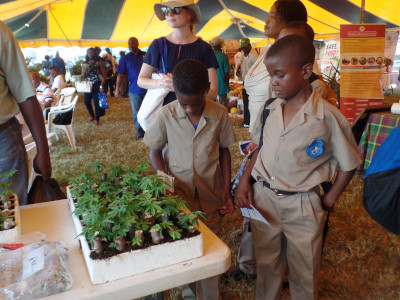 BVM: Once these various new crops are grown and harvested, what happens next?
BVM: Once these various new crops are grown and harvested, what happens next?
Shaw: “We have to get the infrastructure to support agri-processing into a mature and well-oiled arrangement so that farmers don’t suffer from fears of glut or drastic price movement, because that is what turns them off from production. So, I’m setting up a number of processing centers across the country. And these centers will store fresh produce that can be sold out into the market on a timely basis, or frozen and processed. That infrastructure is a very important part of the vertical integration of the agri-processing industry.”
BVM: Can you talk a bit about the Fisheries portion of your portfolio?
Shaw: “In terms of the fisheries sector, we realize that our near shore waters are overfished in fish, lobsters, conch, everything. We have to find mechanisms to get our entrepreneurs into the blue economy, the deep ocean economy. It’s a time for creativity and thinking outside the box. We recently launched a new market in China, where we are supplying live lobsters. We found a way to catch our lobsters, get them into a certain water temperature – they’re, literally, put to sleep – and get them to China within 30 hours, where they wake up. And people are able to purchase their lobsters, live.
“Why should only developed countries like the United States and Canada be in the tuna business when the tuna are swimming past Jamaica once or twice a year? Why can’t we have our own tuna industry? And in deep sea ocean fishing, you have other exotic things like sea urchins, black eels, and other things that are in demand, globally, and they are here in the Western hemisphere. So, Jamaica has to find a way to make fisherfolk competitive. We might have to subsidize some of the fuel costs.”
“And you are aware of the devastating impact of plastics that have been choking our seas and killing off marine life. So, we are playing our part. Come January of next year, we are banning certain types of plastics – Styrofoam and things that are not biodegradable – in the country. We’re taking a very strong stand on these things.”
BVM: Going forward, what challenges confront the government of Jamaica and what opportunities exist to meet them?
Shaw: “When we came to power, our theme was that we must move from poverty to prosperity. And we recognized that prosperity is not something that begins automatically in your pocketbook; prosperity begins in your mind. So, we also recognized that we had to do something about human development. We are placing a lot of emphasis on education; we are placing a lot of emphasis on young people who might have left high school or dropped out of school, on giving them another opportunity for vocational training so they can do something productive. There are a lot of negative influences out there – gangs, scams – and we have to find appropriate, credible, and uplifting alternatives for our young people.
“We have been focusing, recently, on establishing what we call zones of special operation, where the military and police are focusing on getting rid of the crime in our communities. We have established states of emergency in several parishes to do the same thing, even as we continue to promote investment, aggressively.
But the greatest crisis Jamaica faces today, that is holding us back as a country from growing and creating the wealth that we need to create, is not crime, but rather a crisis of human underdevelopment. So, we have to concentrate on developing the human capital of the country.”
BVM: Any final thoughts?
Shaw: “In the Book of Job it says, ‘For there is hope of a tree if it be cut down that it will sprout again, and from the tender branch it shall not cease.’ In every adversity, there is a seed of greater benefit. Find a seed, sow it, nurture it, and greater benefit will emerge. In the 1960s, we were growing by six percent a year; we were among the top four countries in productivity growth. In 1971, in one single year, the economy grew by 12 percent. Jamaica can sprout again.”
Check out this handpicked feature on Jamaica Exploring Use of Bamboo as a Substitute for Plastic, Styrofoam .

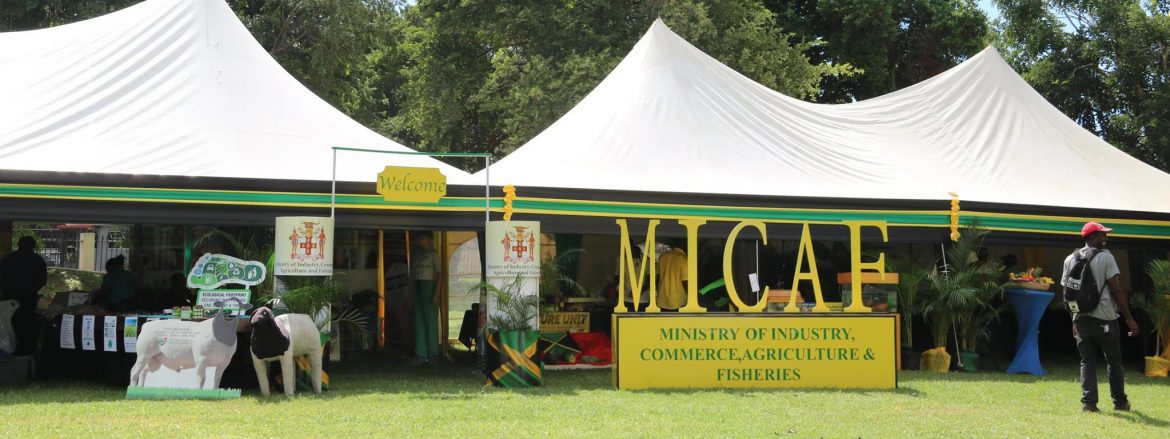
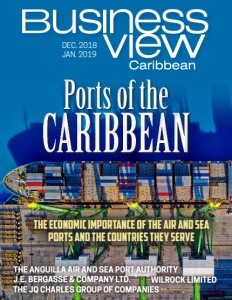
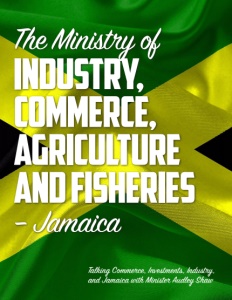
 This information will never be shared to third parties
This information will never be shared to third parties